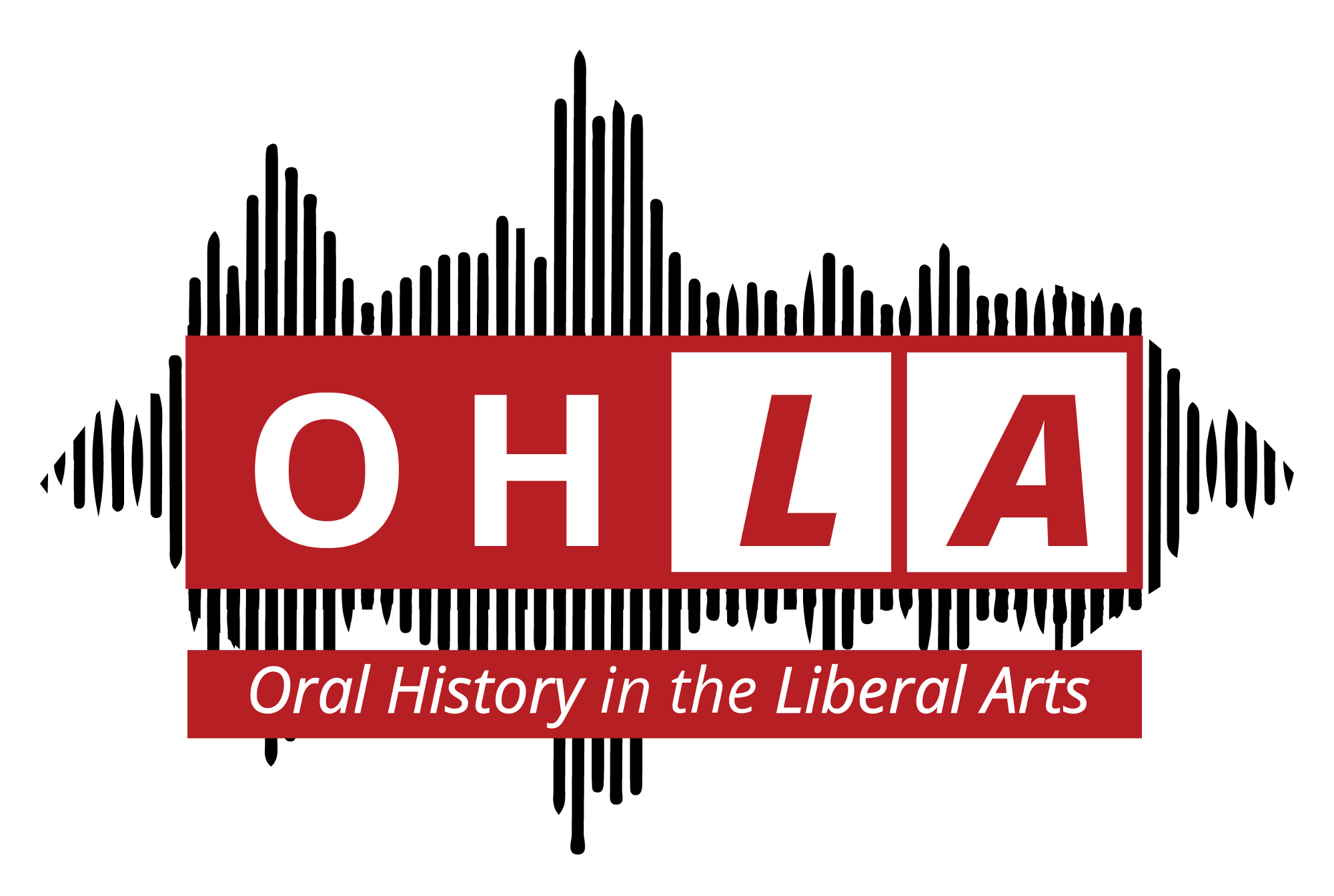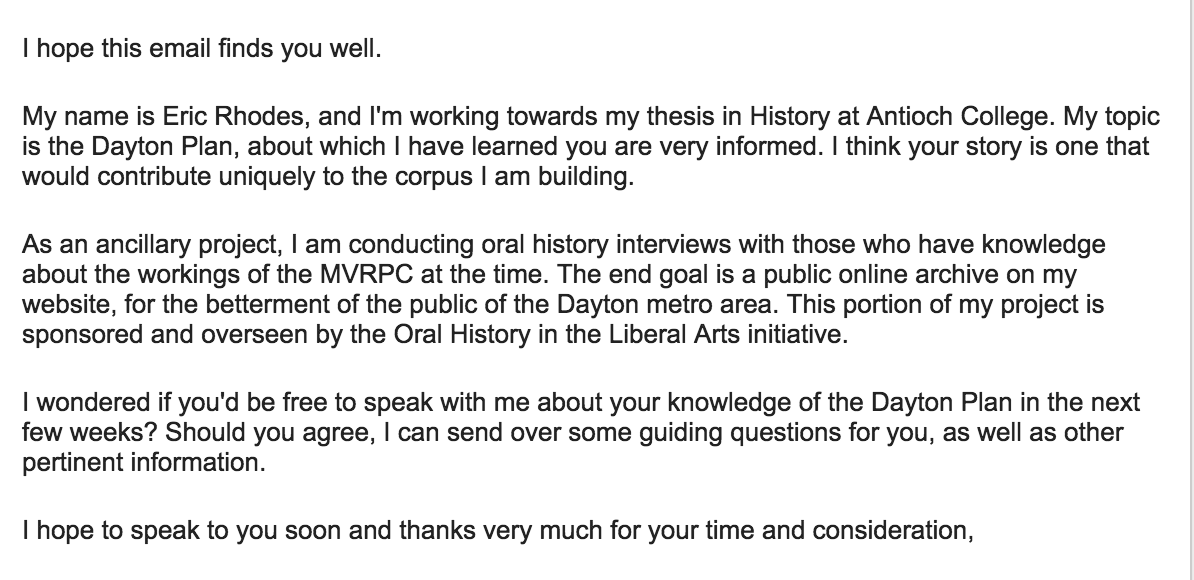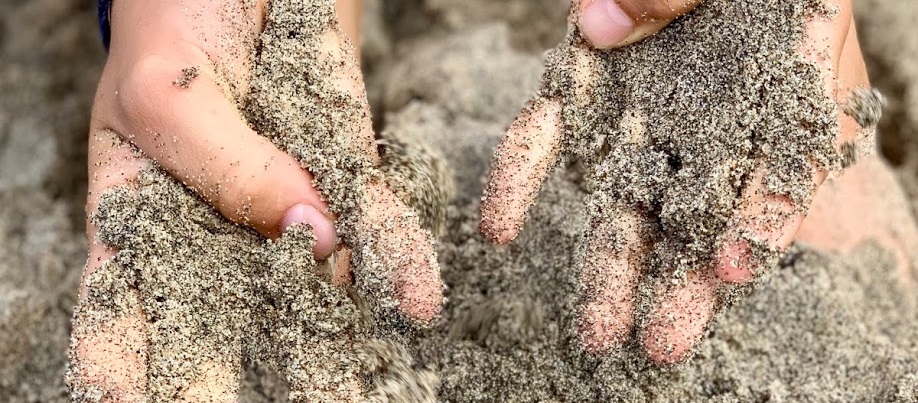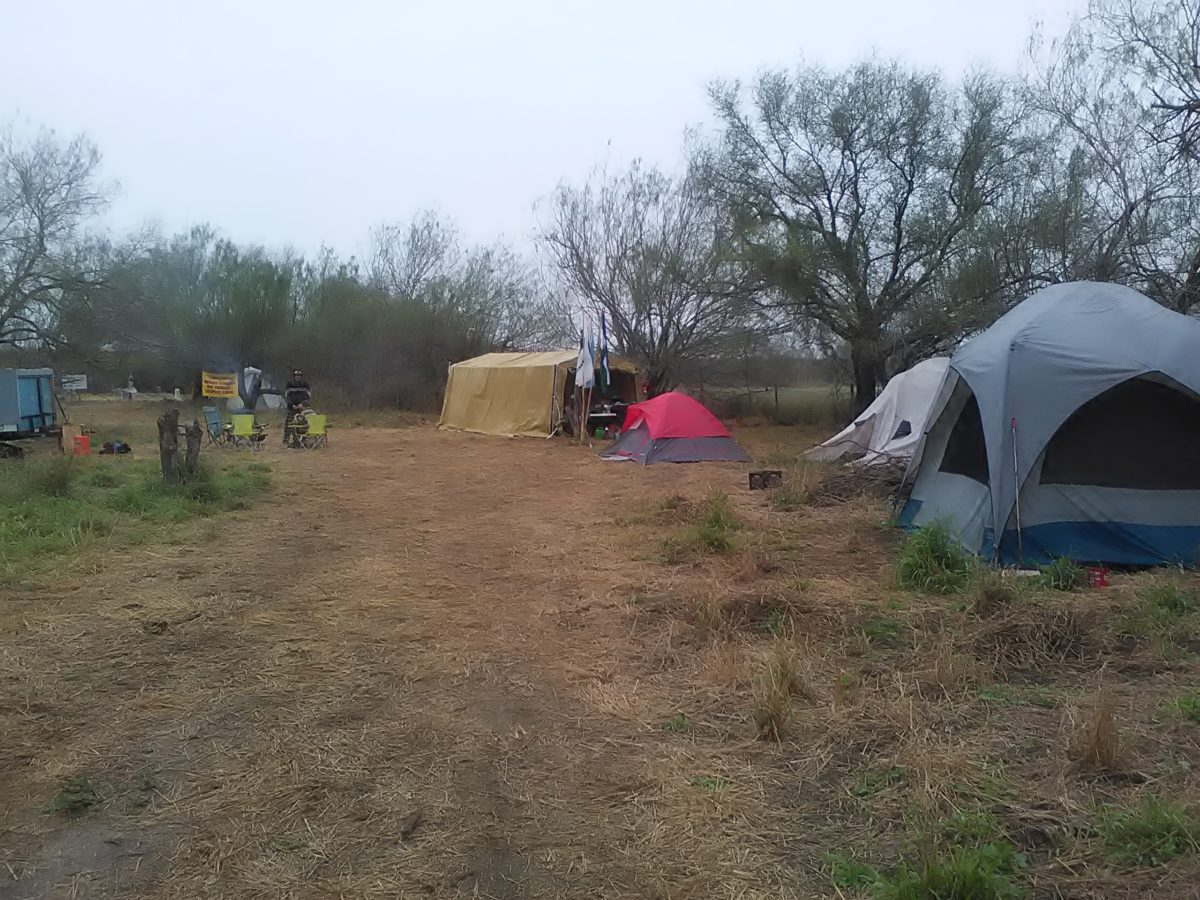It’s not enough to have a good idea when pursuing an oral history project. You must put that idea into action. And the first step towards doing so involves the nitty gritty details of sending clear emails. Email is a good way to proceed because it gives your potential interviewees some space to decide whether or not they’re interested in participating. It also helps to have a written record of your correspondence. Since you’ve made your spreadsheet and have found the contact information for your ten to fifteen potential subjects, let’s draft an email!
Step 1: Introductory Email
This should be a short introduction which states what you’re after clearly. Above all, it should be short, sweet, and to the point. You can follow up after, if your subject is interested. Also, make sure the subject knows you value their input! Everyone wants to be appreciated. Here’s what my first emails looked like. Feel free to riff off of it if you like!
Ms. So-and-so,
I hope this email finds you well.
My name is Eric Rhodes, and I’m working towards my thesis in History at Antioch College. My topic is the Dayton Plan, about which I have learned you are very informed. I think your story is one that would contribute uniquely to the corpus I am building.
As an ancillary project, I am conducting oral history interviews with those who have knowledge about the workings of the MVRPC at the time. The end goal is a public online archive on my
website, for the betterment of the public of the Dayton metro area. This portion of my project is sponsored and overseen by the
Oral History in the Liberal Arts initiative.
I wondered if you’d be free to speak with me about your knowledge of the Dayton Plan in the next few weeks? Should you agree, I can send over some guiding questions for you, as well as other pertinent information.
I hope to speak to you soon and thanks very much for your time and consideration,
Best,
Eric Rhodes
Antioch College ’16
Step 1: Second Email
Assuming your subject responded positively to your introductory email, by saying something like “by all means” in response, it’s now time to send a follow-up email! Since you’ve snagged her attention, you have the liberty of expounding at length about your intentions, the aims of the project, and your hopes for the interview. You should attach all informed consent paperwork at this time so that your interviewee can have it ready for you when you do meet. Attach your most recent CV as well. The idea is to help the subject become more comfortable with the process. See below the email I sent one such subject a few months back.
Ms. So-and-so,
Thank you so much for your prompt response to my email. I’m really excited that you’re interested in being interviewed.
First, a bit about me:
Bio: Eric Rhodes was born in Silver Lake, Ohio, a suburb-within-a-suburb (think Oakwood) near Cuyahoga Falls (colloquially known as “Caucasian Falls”) outside of Akron, Ohio. He attended Western Reserve Academy in Hudson, Ohio, spent one year on scholarship at Caterham School in London, UK studying art and politics, another year at Miami University in Oxford, and yet another at Wright State before finally ending up at Antioch. His upbringing in Silver Lake has influenced his scholarly interests, which for the moment focus on race, housing, and policy’s influences on how both are incorporated into the national social fabric. A History major at Antioch College, Eric will be departing to teach English in France through the French government’s TAPIF, and will be returning to Miami University to pursue his MA in History, at which point he would like to continue on to gain his PhD in the study of the past. Eric hopes to teach History one day.
Please find attached my current CV.
Second, my project and how I think you might be able to help:
My thesis is that federal policy played a significant role in the eventual shuttering of the MVRPC fair share housing plan through a) the moratorium in 1973, b) the HCD Act 1974, c) a lack of support from HUD secretaries vis a vis the support from Romney, and finally d) Reagan’s discontinuation of AHOP funds. I’m interested in what you can tell me about your read of the situation, based on your experience at MVRPC. Generally, what were the factors that conspired against the Dayton Plan and residential racial and economic desegregation that you encountered? Four questions which I’d like to broach, given the time, are included below:
1) What were some initial, local hurdles to implementation that MVRPC was faced with from about 1970 to 1973? Was the MVRPC making progress towards pacifying the “dixie suburbs” when Nixon introduced the housing moratorium in 1973?
2) Was MVRPC completely reliant on FHA for implementing its 235, 236, public housing, 221 projects, was HUD responsible for these, or was it a mix? In any case, did FHA always cooperate with MVRPC?
3) What roles did 701 and A-95 review play in MVRPC‘s success or failure? How did the roles of each change throughout the 1970s, particularly after 1970, 1973, 1974, 1978, and 1981?
4) Was the Plan a success, a failure, or (more than likely) a mixture of both? Why, and what role did federal policy play in making it so?
We may need to take several sessions to work through all of your thoughts on this, and I’d be very open to that. I would be in touch with release forms for your
interviews after. The idea is to post the
interviews along with those from others at
www.daytonhousing.info as a community and scholarly resource.
I wonder if you’re willing to participate, given the above information?
If you are, would May 26 or May 27th work for our chat?
Best,
Eric Rhodes
Antioch College ’16
555-555-5555
And now, it’s a waiting game and a matter of scheduling! Please feel free to c/p these emails and amend them according to your needs. Best of luck in nailing the interview!








